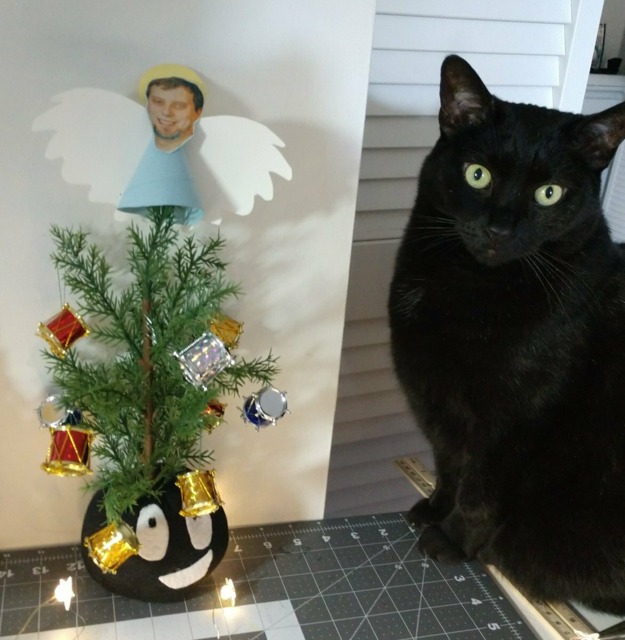
Alex Navarro is an editor for Giant Bomb, and doesn't especially feel like writing a jokey bio this year. He's @alex_navarro on Twitter.
Trying to care about video games in 2020 felt like trying to eat a nice breakfast in the middle of a bombing campaign. Games are, reflexively, the thing I tend to ensconce myself in when things are not going well, but to say that things were not "going well" in 2020 is an understatement bordering on obscenity. With few exceptions, every time I booted up a game this year, a nagging thought of "is this really how I should be spending my time right now?" would creep in, no matter how little sense that thought made. Like, what the hell else was I supposed to be doing this year? From mid-March on, I spent 95% of my time sealed up in my apartment with nowhere to go. It's not as though there was some vast array of better options for how to spend that idle time, but nonetheless, that intrusive thought persisted.
I've seen numerous people describe 2020 as living in a sort of stasis. I thought of it more like living inside feedback. Everything's on this continuous loop, but whenever some new thing disturbed it, it just made things louder and more unbearable. And disturbing things were a constant this year. I mean, 400,000 people are dead in the US alone, a product of a callous and inept response from the people ostensibly in charge of the country's wellbeing. Police violence, climate disasters, death after death after death, it all kept happening over and over again. And now that we're out of 2020, it's not like things are suddenly, automatically better. We're still quarantining and will be for months, if not the rest of the year, because we're so far behind in our response to this pandemic. For fuck's sake, we can't even agree on how we're supposed to go about vaccinating people.
I've tried really hard over the last year not to dwell on all that misery, but when you're still in the thick of it, that's tough. So I try to find things to retreat into, and inevitably I turn to games. I played a lot of them, and in the case of nearly every game on this list, I genuinely loved them. But I never quite shook that feeling that these were mostly distractions from the reality taking place right outside my door, and the thoughts kept returning, and the feedback loop kept getting louder. Maybe in writing this, I can finally break that loop and find a way to feel good about this stuff again. I hope so, because I miss feeling good about much of anything, let alone video games.
Before I launch into the list, I want to give a few shouts out to the folks who hung out with me as we streamed throughout the year. Getting to indulge in my offline Rock Band and Truck Simulator habits for you folks was a balm on my soul this year. I couldn't really go out and play shows or drive many places throughout the year, so getting to mess around with those games, and y'all taking that journey with me, helped tremendously. Thank you, thank you, thank you.
I also want to shout out some games that didn't quite make it onto the list. Despite the pandemic rendering in-person experiences nearly impossible, I didn't actually get into many multiplayer games this year. I kinda went in the other direction, hunkering down with single-player experiences to hide away from the world. That said, games like Deep Rock Galactic and GTFO were some of the best times I had with my coworkers this year. Deep Rock in particular is a real goofy gem, and a tremendous amount of fun if you've got a few friends who like to dig and shoot. art of rally was my driving game of the year, which is weird to say considering much bigger, hi-fi rally games were released in 2020. But its minimalist art style and tight controls were a breath of fresh air, to me, and it became something of a zone-out game of choice for a solid month. I never touched a controller in Microsoft Flight Simulator, but I watched people play it all throughout the year, and it's one of the most impressive things I've seen come out of games in ages. I didn't end up playing 13 Sentinels or There Is No Game or Paper Mario: The Origami King, but after hearing my coworkers speak so positively of them, they're next on my list.
And lastly, I want to give a special shout out to Blaseball, my favorite weird thing of 2020. Blaseball, for those who don't know, is a simulated sport that operates in a universe where players have names like Jaylen Hotdogfingers and Curry Aliciakeys, the threat of players being incinerated is a constant worry, and old gods shaped like peanuts periodically show up to challenge teams to JRPG battles that sort of resemble baseball. It's a browser-based experience, and while the developers take the role of capricious gods/commissioners, adding terrifying new possibilities to the world and issuing dire warnings about what might happen if those possibilities ever come to pass, it's the community that ultimately drives the narrative forward. The players and their weird names don't come with baked in personalities and lore, but the people who love Blaseball are more than happy to fill in those margins. In that way, it sort of reminds me of the e-fed I used to participate in when I was a teenager. An e-fed, for those who don't know, is essentially a roleplaying group for especially dorky pro wrestling enthusiasts. People would craft their own characters, type up their own promos, and imagine the matches that were taking place between them. In our case, we didn't have to imagine, exactly, because all the matches were simmed using N64 wrestling games, giving us simulated competition to base our character moments around. Blaseball hits a familiar note, letting the simulation mostly play out while the community votes for all the ways they'd like to see it break.
It's also largely impenetrable if you aren't following along constantly. I lost the main threads at least six different times over the course of last year, relying on Cat Manning's recaps to catch myself back up. It's a commitment, and I think that's the one thing The Game Band will probably need to figure out once Blaseball returns from its current Siesta and eventually works its way out of beta. The community driven nature of the thing is fascinating, but they need to find a way to communicate the events of the game that don't rely entirely on unpaid fan labor. Don't get me wrong, I adore the enthusiasm of that weird little community, and I'm not saying the devs have to completely retake the reins and overwrite the work those folks poured their hearts into. I just want to be able to talk to people about Blaseball without having to preface it with several thousand preambles about what the hell is going on.
Anyway, go Tigers. Never look back.
Speaking of which, here is a look back at the games I enjoyed/spent the most time with in 2020.
11. Assassin's Creed Tsushima/Ghost of Valhalla
Sometimes I get through a year and two unaffiliated games get stuck in the same space in my brain, to where they become inextricable from one another. Some years the connections are more tenuous, but these two games maybe make sense in a more obvious way. One of them is a game very specifically modeled on an older version of the other game's franchise. One of them is a sequel so far into the wilds beyond what the other is trying to emulate, it makes the other game seem almost quaint by comparison. One of them is a game about Japan made by Americans owned by Japan. One of them is a game about vikings in England made by French Canadians and up to 14 other nationalities, depending on which support studios worked on it. Shorter version: They're big dumb open world games with enormous aspirations and inconsistent-at-best execution. And I have a strange habit of getting into precisely that sort of game, even when I know my time would be better spent elsewhere.
Ghost of Tsushima likes old Assassin's Creed enough to finally do the thing people were begging Ubisoft to do for years, which is to do one of those games in feudal Japan. I never quite clocked why Ubisoft seemed so reluctant to do anything in Japan. Considering how cavalier about historicity they tend to be, maybe they were worried that they couldn't figure how to turn Oda Nobunaga into a Templar without pissing some people off. But, like, ninjas exist. You can just do ninjas. Everyone has done ninjas at one time or another. There is nothing Ubisoft could have done to disrespect the concept of the ninja that Godfrey Ho has not already done dozens of times over.
Maybe the nervousness was specifically around doing samurai stuff, which I sort of get. Nobody wants to do another Last Samurai (or, at least, I hope not), but eventually someone was going to fill that void. And fill that void Sucker Punch did. Granted, they did a mostly toothless and predictable spin on the Kurosawa oeuvre, but people ate it up. I even enjoyed parts of it. The sword combat has that nasty oomph behind it, that satisfying impact of a blade through meat that something like this should have. Every character except for Sake Quark is tragic and sad for 90% of the game's runtime, but the main personalities are generally likable enough that you mostly feel sad with them. The parts where you disrobe and slide into a nice warm bath to have a good think about your uncle were peaceful, if also hilarious.
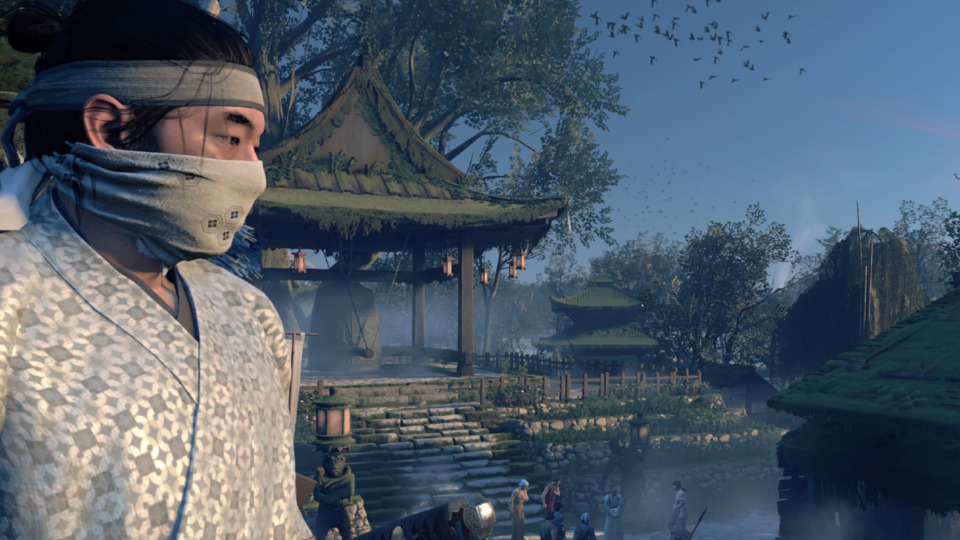
And, of course, the prettiness of the game cannot be overstated. It is a relentless prettiness, a storybook vision of Japan that feels every bit like the elaborate set that it is. Just a ceaseless breeze of leaves and twinkles in every corner. I liked looking at Ghost of Tsushima, even if it never actually grasped the cinematic flavor they were going for. This doesn't really look like a Kurosawa movie, even if you turn that black-and-white mode on (sorry. I'm sorry). It can't, because it's not a movie. It just wants you to know that it really liked those movies, and respects them. They're good movies, so I get it. But I wish they liked some other samurai stuff. It's a varied and frequently lurid genre. Ghost of Tsushima is borderline chaste, comparatively, possibly for the same reasons that kept Ubi from tackling this particular nation's history. It went to the trouble of setting itself well before the era of samurai most people are familiar with, seemingly to pluck out a non-Japanese enemy the player could dice up without having to worry about portraying the native Japanese in any sort of challenging light. I mean yeah, there are ronin and bandits and whatnot to fight, but that's about it. Otherwise, the closest it gets to anything resembling a thought about the culture and era it's portraying is a half-baked plotline where Jin, the titular ghost, feels very bad about using guerilla tactics over the course of the Mongol invasion, because it works against the samurai code he was raised in. He doesn't feel badly enough to ever stop poisoning dudes, but bad enough that he remarks upon it from time to time, and his uncle, who is old and out of touch, gets so mad they have to have a sword fight about it.
All of that said, I liked this game enough to do every notable objective on the map, which took like 30-40 hours. More on that in a moment.
Assassin's Creed Valhalla is proof positive that you are never getting another Assassin's Creed that doesn't want you to think it's The Witcher 3. I get it, that was a very well-liked and celebrated game. And to be clear, it's not that I dislike this formula. AC Origins took a little while to get going, but ultimately justified itself by the time it wrapped up Bayek's journey. Odyssey less so, but bouncing around the Greek islands, stabbing half the population and boning the other half, was fun enough for a while. I don't think I ever quite got there with Valhalla, and it wasn't from a lack of trying.
The team(s) behind this one did a good job of making England feel like a magical place. It's a bleak, shitty magic, but it gets the point across. Life in England circa-800 A.D. seems like a giant pain in the ass. Everybody lives in the strewn carcasses of the long-since-departed Roman Empire, and all there is to do all day is toil in bogs and get yelled at by priests and drink yourself into an early grave. If you were born into a life of any station, there's a strong possibility at least eight people are trying to murder you at any given time. And to top it all off, extremely hot vikings keep showing up on your shores and hollowing out your monasteries. It's some bullshit, man, but thankfully the game puts you in the role of one of those extremely hot vikings, so you're free to run around and pillage the shit out of everything while all these Saxons can do is flail and shriek like Monty Python extras.
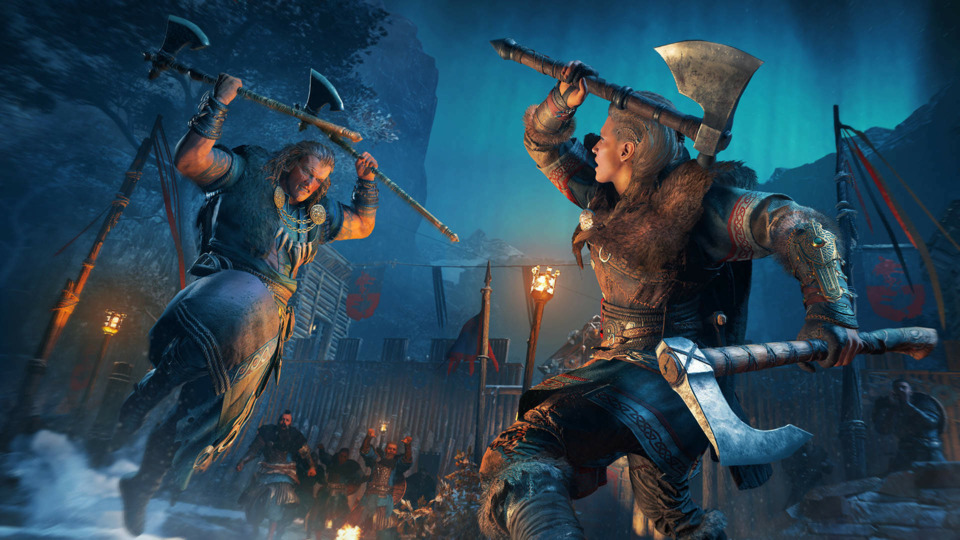
Roughly 80-85% of Valhalla's length is spent bopping from hamlet to hamlet, recruiting puppet kings and shanking anyone who stands in the way of your political ambitions, which amount to total and complete control of the land. You are meant to be excited when you learn that you have successfully turned the tide in places like Snotinghamscire and Grimsby. You are meant to take places named like this seriously, which is one of the game's many problems. Sometimes there's a bit of intrigue in these individual conquest plots, and occasionally someone gets their lungs ripped out of their body and refashioned into something from an episode of Hannibal. That doesn't happen often enough, to be honest. When the game tries to be weird, like when it has you get wasted on elixirs and fall into a k-hole that looks a lot like Asgard (does that make it an a-hole?), it never really gets as wild as it feels like it should. By the time it finally connects itself to the larger plot involving Layla and the current Earth Problem, I was really only pushing myself forward for the sake of seeing what the ending looked like. And what the ending looked like was real fuckin' dumb. The jury's currently out on whether it's the right kind of dumb.
All of that said, I liked this game enough to do a huge percentage of notable objectives on the map, which took exactly 108 hours. ONE HUNDRED AND EIGHT.
I want you to understand that this is not a new problem. I play a lot of these sorts of games, and if the rhythm of map uncovering and objective completion is wired in just such a way, there is a 99% chance I will see it through to the end. I often refer to this as a lizard brain instinct, some buried notion deep in my psyche that outright requires me to uncover any map I see obscured by fog. I hear Kill Bill sirens that will not quiet down until I've been everywhere I possibly can be, and touched everything I can possibly touch. The content contained within that map does have to meet a certain standard of passibility, but that standard is arguably lower than it should be. This is a problem, and I recognize it as such.
I do not believe in New Year's resolutions, but I am going to make a promise to myself that I will recognize when I am digging deeper into an open world game than it likely deserves. I will love myself enough to tell myself when I am giving in to craven instinct. In 2021, I will only play one of these big dumb open world things if I am really, genuinely enjoying it. If this means I do not spend 40 hours in someone's fan art of Japan, or 108 hours in yet another era where people were often stabbed, so be it. I will learn to live with maps still obscured, their objectives unknown to me. It's just another bandit camp, dude. Walk away.
10. Treachery in Beatdown City
Streets of Rage 4 is the beat-'em-up everyone seemed to latch onto last year, and it was for good reason. DotEmu did a really solid job of walking that thin line between genre celebration and genre pastiche, and I'm sure I'll go back to it from time to time like I do the other games in the series. But the beat-'em-up that stood out to me a bit more in 2020 was Treachery in Beatdown City, a game that I helped Kickstart back in 2014. It's not quite enough to say Treachery has been in development for a long time. The first playable build that Shawn Allen, the game's primary developer, showed me was on a PlayStation Mobile device. Shawn has been working on this thing for years, trying to find time amid various life upheavals to continue development and see it through to completion. I'm glad he did, because there's really something to its concept.
It's a turn-based game. You walk around an overworld map in a New York City-like, running into batches of shitheads who are standing between you and your party's mission of rescuing the president, and when an encounter begins, the screen shifts to what looks like a corner from an early Double Dragon game. When you approach an enemy, the screen shifts to a menu, asking how many points you want to spend for a particular attack or combo. You have to manage this bank of points, or you'll wear out, and suddenly your opponents will start dumping on you. Unlike, say, Yakuza: Like a Dragon, which also shifted itself into a turn-based system this year, you can't stand around for an unlimited amount of time deciding what to do next. You have to stay moving around the screen, putting yourself into position to attack and maintaining defensive awareness is key. It's a neat little system that plays off the rhythms of a fight while giving you a different kind of command over it.
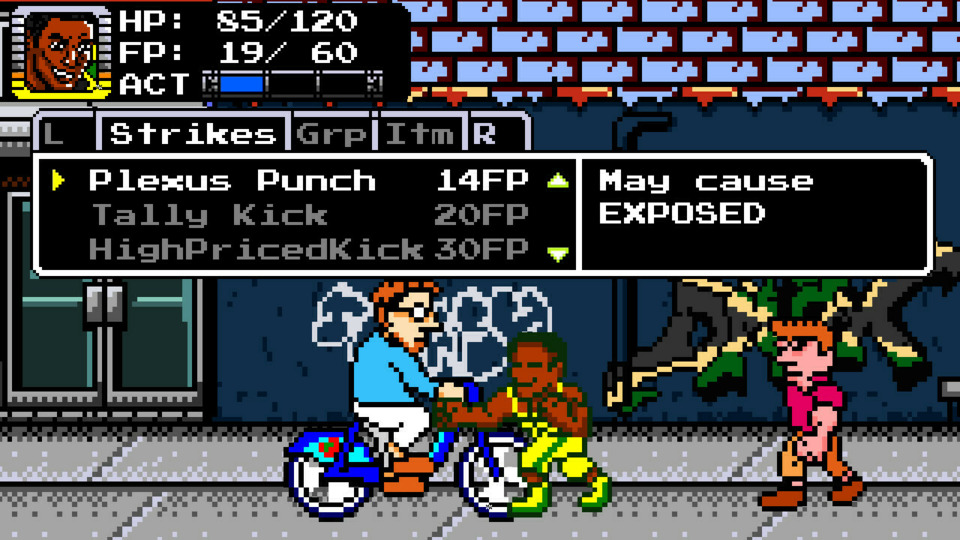
The shitheads you encounter aren't the usual gang archetypes of the genre, either. This is a game that is very much reflective of its creator, his politics, and his sense of humor. It's not subtle at all, but beat-'em-ups rarely are. Whether you're kicking the shit out of some addled '80s stereotype of a punk or gang member, or a dickhead gentrifying bicyclist, you're fighting a developer's notion of what constitutes a threat. Treachery in Beatdown City isn't exactly lighthearted, but it can be funny, and even when it isn't, there's a spirit to it I managed to vibe with the whole way through. I'm glad Shawn finally got to release his game, and I hope whatever he chooses to make next doesn't take most of a decade of his life to create.
9. Astro's Playroom
I was a Nintendo kid for the duration of my life where one could reasonably describe me as a kid. I had all the Nintendo home consoles, played all the big Nintendo games, even subscribed to Nintendo's state-run media. I mention this to emphasize that the degree of nostalgic fandom one might assume you would need to enjoy all the PlayStation ephemera baked into Astro's Playroom is largely absent in me. I like PlayStations, but I do not value them as fetish objects in the way that Astro's Playroom seems to want to present them. Reader, when I tell you that Astro's Playroom still managed to win me over with its lovingly rendered collectables, not to mention its greatest hits collection of Things You Can Make the DualSense Do, I assure you that I am every bit as surprised as you are.
Maybe I shouldn't have been. Astro Bot Rescue Mission was one of the only things I really enjoyed using the PSVR headset. Asobi Team seems to have a firm command of how to translate cute robots into whatever new doodad Sony dreams up. The core game is a mostly simple, but effective platformer that relishes every opportunity to make the controller vibrate in complicated ways, or make triggers squish at varying resistances. It's nifty stuff, and precisely the sort of demonstration of the DualSense's capabilities that was otherwise missing at the PS5 launch. Nobody really does pack-in games anymore, and it's nice to see one crop up that's both a good advertisement for why you might want to drop $500 on one of these things, and a fun time on its own merits.
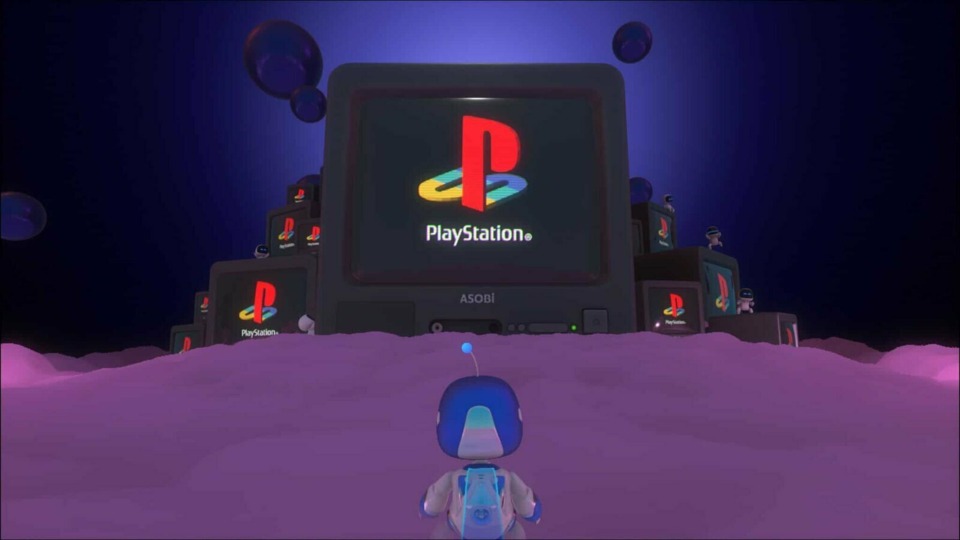
And then you start collecting all that lavishly reproduced PlayStation hardware. Once you find something in one of the game's four worlds, it pops up in the game's hub area, while little astro bots/astros bot scurry all over and around them. It's very cute, and I enjoyed that they did this. People say this is Sony out Nintendo-ing Nintendo in the nostalgia space, and that might be true. Again, I don't have quite that same attachment, but I liked that they were there.
More importantly, I think it's time for Asobi Team to branch out into other dormant PlayStation franchises. Astro is a fine mascot, and I look forward to seeing what kind of vibrator Sony releases next for the little guy to adventure in/around. But according to my calendar, it has been more than a decade since the last Ape Escape game, and even longer since the last one anyone really liked. Who better to create The Next Great Game in the Ape Escape Franchise than this thoroughly capable developer? Make the right choice, Sony. Make the only sensible choice. Give us an Ape Escape with next-generation vibrations. Make those monkeys vibrate!
8. Tony Hawk's Pro Skater 1+2
Skateboarding is both one of my favorite things in the world and one of my greatest shames. I was a skate teen, baggy ripped jeans and Birdhouse t-shirts and all. I hung out with other skate teens, and we skated together. Well, if I'm being honest, they skated. I flailed around and pretended like I was keeping up. It took me years, years, to pull off an acceptable in-motion ollie. I don't know why exactly I never took to it. I loved it, and wanted so badly to be able to make my body and brain sync up well enough to do even a handful of decent tricks. I'm not going to sit here and tell you that I practiced as often as I should, or that I was single mindedly dedicated to the task, but given the absolutely abysmal results of my early attempts, a bit of discouragement is understandable. There was an interview with Amanda Peet in the New York Times a couple of years ago (don't ask me why I remember this, or even read it in the first place) where she was talking to the reporter about her love of tennis, and her absolutely astonishing lack of talent at it. The quote I remember from it was, "It’s really horrible to love something and suck at it so much." Yeah, it really is.
This is a long wind-up to explain that when I eventually found my way to the Tony Hawk games in Tony Hawk's Pro Skater 2, I found an avenue to enjoy something it was clear I would never be able to do well myself. These are not realistic skateboarding games, but they get at the heart of what's fun about the sport--namely, flying through the air in ludicrous ways and landing squarely on a plank with wheels. I have crystal clear memories of hooting and hollering as I racked up gobs of points, flipping and grinding over the scenery while Millencolin blasted through my tinny TV speakers. I love these damn games, especially the first four of them. And if Activision hadn't previously boned up remasters and reboots of the franchise, I probably would have been very excited for Tony Hawk's Pro Skater 1+2. Thankfully, my trepidation was unwarranted, as Vicarious Visions got these games just right.

It's not that they're perfect copies of those old games, but they play in a way that feels true to the memory of them. The roster is a nice mix of contemporary names in the sport and the original skaters from those first two games, who have been rendered in their current ages. It's like watching parents and their kids skate together--quite literally in the case of Tony and Riley Hawk. The soundtrack still rules, and the new songs they added are mostly good and appropriate.
The only bummer about this remake is that my Tony Hawk skills had rusted over so thoroughly that my early runs felt more like my feeble early attempts at real skateboarding than anything one would normally do in these games. The combos weren't coming to me as quickly, and I felt like I was plodding through the levels one objective at a time. Eventually I got back to a place I'd call acceptable, but I'm a long way from the heady days of clearing whole objective lists in a couple of runs. Thankfully, I enjoy this collection enough to keep pushing myself to try and get back to where I was. Vicarious Visions did a great job, and whether or not there's a chance for a new Tony Hawk game on the horizon, or at least an additional batch of old sequels ready to get this treatment, I'm plenty satisfied with what they pulled off here.
LATE BREAKING NEWS: LOL whoops! So much for more of that!
7. Fuser
Fuser is a game in which you annihilate popular music. You are given a set of four turntables, each corresponding to one of four stem tracks in any of the game's available songs, and then you obliterate and recombine them into unholy constructions the likes of which should never be allowed. It's awesome.
It's also more or less Dropmix, the board game thing Harmonix made some years back where you'd drop cards representing those same broken up stems onto a board to make your musical abominations. The software version adds a number of tools of the DJ trade that let you really go to work on these songs, looping and pitch shifting and crossfading to your heart's desire. It also adds a campaign that isn't much more than a long tutorial for the various DJ tools you've been afforded. It serves its purpose, but it's not the draw. The draw is grabbing a bunch of records and taking a hammer to them to see what kinds of Neil Cicierega-esque nightmares fall out of them. The whole thing would be just awful if the tech didn't properly blend all these disparate songs, and while it's not flawless in that regard, it manages to achieve a degree of consistency that is surprising and wonderful.

I worried when Fuser launched that Twitch's outright cowardly response to the waves of DMCA takedowns the recording industry lobbed this year would negate people's interest in streaming it. Thankfully, it seems like people have mostly been able to without issue. That's good, because Fuser is a game clearly meant to be played with an audience. What's the point of doing all these music crimes if no one knows about them? People need to know what it sounds like when you lay the vocals from Tubthumping over a Deadmau5 beat and the guitar riff from "Killing in the Name Of". It sounds like shit, and it fucking rules!
6. Marvel's Spider-Man: Miles Morales
In stark contrast to my earlier complaints about falling prey to long open world games that I'm only somewhat enjoying, here is a very short open world game that I enjoyed just about the whole way through. This is not a full sequel to Insomniac's 2018 Spider-Man, but it's more than enough of what was good about that game, plus a few new bells and whistles and, frankly, a more interesting protagonist. Here, Miles is officially Harlem's Spider-Man, but he hasn't quite been doing it long enough to feel fully confident in his powers. Peter's around initially to help him out, but after he takes a convenient trip out of town, he hands you the responsibility of managing the city on your own. This proves challenging, as a rogue energy company and an HDR-enabled youth group are battling one another in the streets, and you're left to clean up the mess.
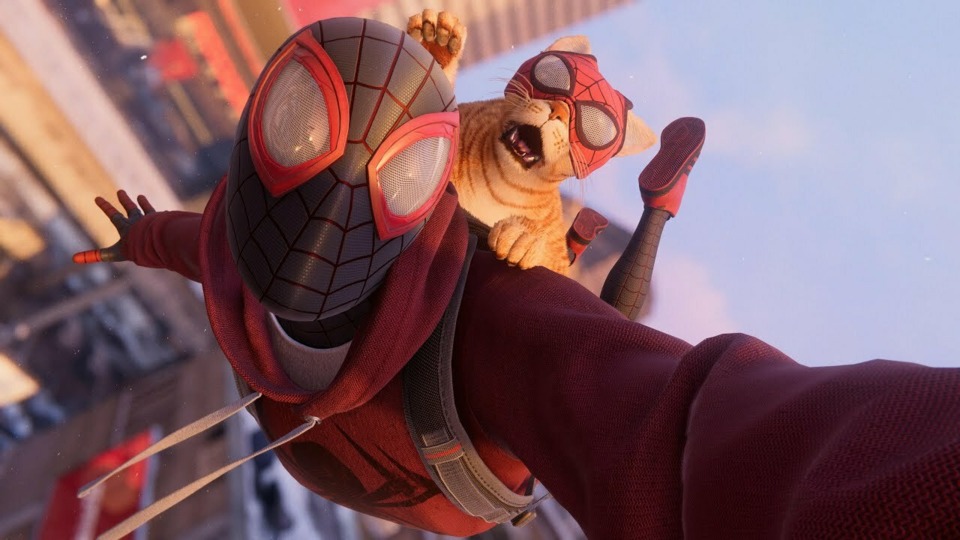
These conflicts are not the most interesting part of Miles Morales. The fights are fun, and the new venom powers add some much-needed variety to the original combat system, but the real draw here for me was the moments where Miles just gets to exist in the city. Be it swinging up and down the avenues, or walking through a snowy street fair, this New York is livelier than the 2018 game's vision of the city, and feels a bit more lived-in. In a year where I barely got to be outside in this city, a place I've grown to really love over the 10 years I've resided here, it was nice to be out there, whooshing around and helping folks whenever they needed it. Yeah you're still running down checklists of objectives, but the lack of bloat in that area is a real plus. I felt OK about 100%-ing everything because I didn't have to dedicate whole months of my life to it.
If anything, this game proves that Insomniac has a good grasp of this character and how they want him to fit into this particular Spider-verse. I do hope they give Miles a meatier game down the road. My instinct tells me they're likely setting up some kind of dual-Spidey co-op thing, and I can see the potential for that to be fun. But I also think Miles could easily front a larger, more fleshed-out game. He's gone through the growing pains. He's ready to carry the Spider-Man name on his own.
5. Animal Crossing: New Horizons
Enough words have been said about New Horizons' fortuitous release timing that I do not feel compelled to repeat them at length. Yes, having a game where you can live on a pleasant, peaceful island with a bunch of friendly folks and a system of government and commerce that actually function during a real-life pandemic in which we were instructed to avoid all human contact and were afforded next-to-no material support from our government or commercial systems in order to do that responsibly was, frankly, incredible. I mean, that's the whole thrust of Animal Crossing, right? You play these games to live in a world where everything just sort of works and you can hang out with neighbors you actually like. They're not complicated, and even when they kind of change from sequel to sequel, they never really get that far out of pocket (Happy Home Designer and Pocket Camp notwithstanding). It's an old reliable in an increasingly unreliable world. Of course it became astronomically popular in a year where we were all stuck indoors, and our whole society felt like it was hanging on by a thread.
There's a laundry list of things I could complain about in this game--the junky online systems, the mostly uninteresting vacation islands you farm for resources, the tiny amount of space other villagers get, Bunny Day, etc.--but honestly, outside of very specific critical conversations I had with other folks, I can't say I ever gave that much of a shit about the things New Horizons whiffs on. Should this have been a more exciting sequel? Considering how long it's been since the last proper one of these, yeah, probably. But did I play this game every damn day for the lion's share of 2020? You bet Tom Nook's fluffy tail I did.
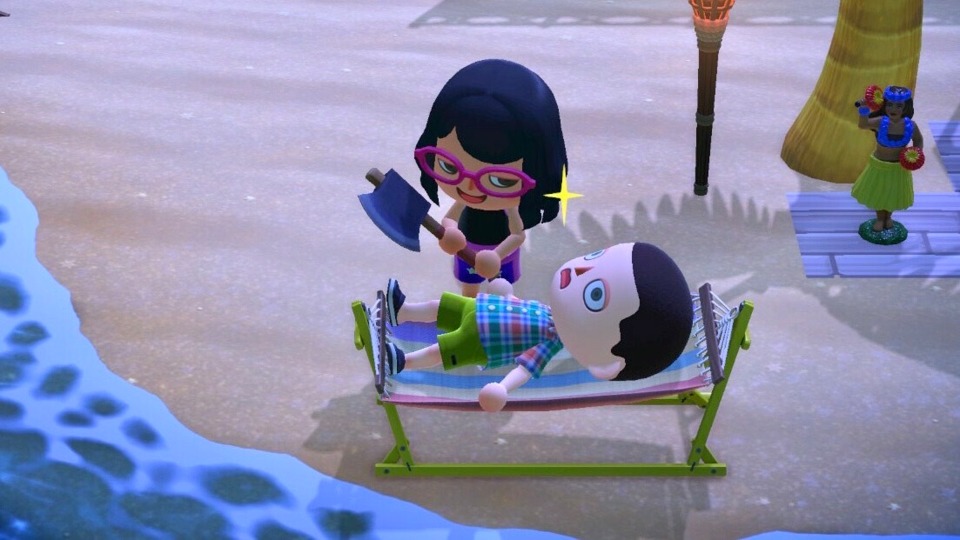
More importantly, New Horizons was the game my girlfriend Sam latched onto this year. She doesn't enjoy a great many video games, but when she finds something she really likes, she digs in and makes it a part of her daily routine. Whereas I started to trail off around October or so, dialing in once or twice a week to do some chores, see what's in the store, and catch the odd K.K. performance, she has been dedicated to making Monkey Island into the space she envisions it to be. Every day she logs in and puts in some serious work on that island. I had plenty of other games to distract me throughout the year, but this was her thing, and I could see it really helped her in taking the edge off the year's endless cavalcade of awful shit. I can't ever be mad at a game that did something like that for her.
I would also like to take this opportunity to apologize to her for never doing anything with my front yard. I'm sorry that all I've managed is a randomly placed hammock, garden gnome, and telescope. I know you would like to develop that real estate into something more befitting of your grand visions, and I am like Danzig keeping a pile of bricks on his lawn to the dismay of everyone on his block. Thank you for your patience over the course of this year, and I promise to stop promising I will ever do anything with my yard.
4. Yakuza: Like a Dragon
Like a Dragon is maybe the lumpiest game I have ever truly enjoyed. I ended up double-fisting this game with another big open world game, AC Valhalla, and the difference between the two--besides the obvious mechanical ones--could not have been more stark. Where Valhalla was mostly a flat line of basic enjoyment for the majority of its campaign, Like a Dragon was like an EKG monitor hooked up to someone who is currently being electrocuted. The peaks and valleys were all over the place, but in the end, the highs outnumbered the lows.
I'm very much on record with my love of Ryu ga Gotoku and the games they make. It's a recently developed love, but I'm all the way in. Like a Dragon is the first of these mainline Yakuza games to move away from its primary protagonist, everyone's favorite dopey crime dad, Kazuma Kiryu. Given how many generations Kiryu's story spanned, some concern over how that kind of shift would work was warranted. Even more so when it was revealed that the game had gone full JRPG, shifting from the traditional beat-'em-up gameplay for a turn-based system with a party of other fighters backing you up. This could have been a catastrophe, and if I'm being completely honest, there are some swings this game takes that don't connect with anything but its own skull. But when Like a Dragon is firing on all cylinders, it's a wild and wooly time that ultimately succeeds at carving out its own unique space in the pantheon of Yakuza.
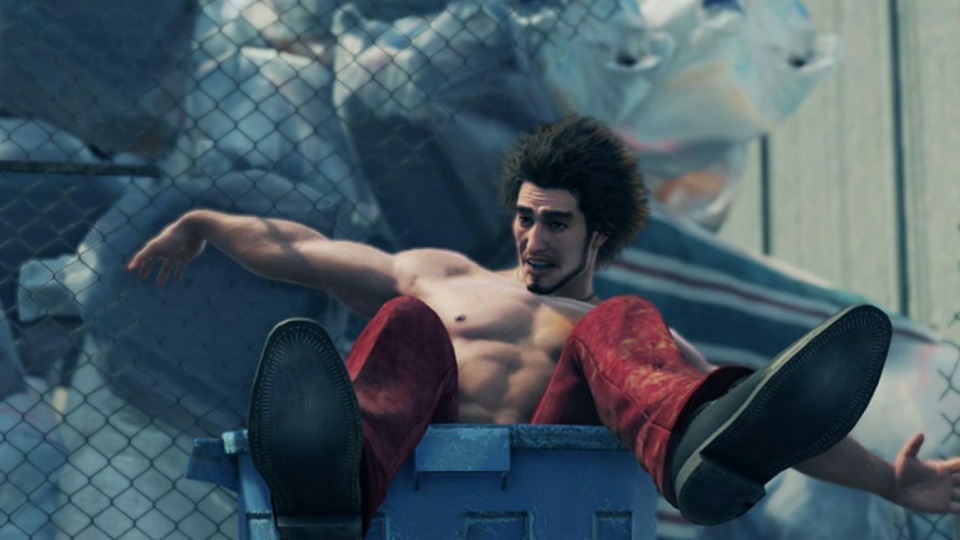
First and foremost, Ichiban Kasuga is a total dude. He's a dope of the utmost pedigree, a guy who believes so completely in the love and support of his friends that he never sees any betrayal coming. He goes to prison for 18 years as a favor to the Yakuza patriarch who more or less raised him, and when he is brutally rebuffed upon his release--and by brutally rebuffed, I mean shot in the fucking chest by said patriarch, and dumped in a homeless encampment in Yokohama--his first instinct is not to say "fuck that dude", but rather dedicate his every waking moment to uncovering why that dude would shoot him in the chest, and prove that it was somehow, improbably, for a good reason.
Along the way he makes numerous friends around the Yokohama underworld. The party is the gravitational center of this game. You fight beside them, you converse with them, you drink with them and solve their personal problems that crop up throughout the story. Some characters are more engaging than others, naturally, but they all work well as a unit. I just wish the two women in the group had more reasons to be there besides "I'm the twin sister of someone you helped, and now I'm hanging out with you" and "I'm bad at business, please save my snack shop". Like I said, they're all good people, some of them just get more fleshed out motivations than others.
The new battle system is not a total success, but it is quite a bit of fun. The summons and special attacks you unlock as you build your rapport with your party are a hoot, and they still give you plenty of animations where people's faces are getting wrecked to shit. I do miss the freeform carnage of the old fighting system, but for what they're trying to accomplish here, it mostly works as it should.
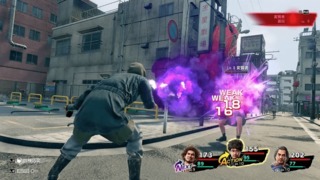
And like the rest of this series, Like a Dragon tries to walk a razor thin line between wackiness and sincerity, and it mostly pulls it off. No matter how batshit stupid the plot gets--and let me be clear, it is on some S-tier bullshit by the time it wraps up--the developers' obvious affection for Kasuga and his crew always shines through. You can tell they really like these people, and that's vital for making something as off-the-wall as this story fly. As I said, it has its stumbles. It's a game that rightfully calls bullshit on Kasuga running off at the mouth about how the homeless folks who take him in just need to buck up and push themselves back into working life, with his compatriot Namba (in his best character moment) laying out for him the manifold reasons why these men are where they are, and the societal roadblocks that stand in the way of their prosperity. It also then turns around and plays on some pretty well-worn stereotypes about homeless people to give Namba his array of wacky attacks.
All of that said, this is a series that is, I think, decent at learning from its missteps. Like, The Pleasure King wasn't all that long ago, and I feel like they saw how people responded to that and tried to do better. Like a Dragon is a great time, one of the best I had with any video game this year, but it's not without things I can point to and say "I wish they'd treated this with more care." Thankfully, I have confidence that they'll iron out that stuff as they move forward with Ichiban's continuing adventures, adventures I'm very much looking forward to experiencing.
3. Kentucky Route Zero
Kentucky Route Zero was the game I was forever putting off. I've owned it since the first act dropped back in 2013, and I played a little of that chapter before deciding that the way I wanted to play this was as a complete sequence. When I made that declaration, it was not with the notion that it would be seven years before that time would come, but I nonetheless held fast. I did not touch Kentucky Route Zero again until it was released in totality on consoles, and over the course of one very emotionally fraught week, I played the whole thing and fell in love with it.
There is a lot of very good writing about Kentucky Route Zero that I would rather not rehash. You should read Austin Walker's review from last January, as it is, I think, a perfect summation of where the game goes and what it's trying to say. And Scott Benson's top 10 list from this year also captures the weight of the game's world and what makes it so captivating. Interestingly, both pieces end up weaving personal stories of heartache and suffering into the summations of the game itself. It's a game that lends itself to that sort of thing, I think, not just because it tells a familiar, if fantastical, story of loss, desperation, capitalism, and the like, but because it radiates a kind of sympathy that isn't like much else I've played. It is certainly a strange game, filled with striking and impossible feeling set pieces, and characters that are at once deeply human and tremendously peculiar. But no matter how magical its world appears on its face, its roots are in an America that is all too familiar. One where institutions and support structures are hollowed out beyond repair, and all there is to do is find a way to make a life within the haunted--and, in some cases, reclaimed--spaces.
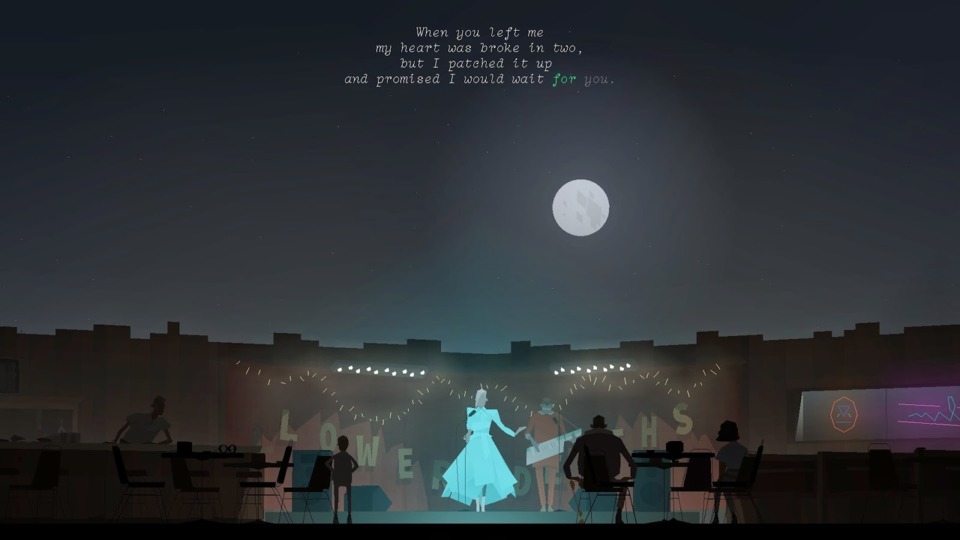
All I will add is that, for all its tragedy, Kentucky Route Zero is one of the most beautiful games I've ever played. Not just aesthetically, though Ben Babbitt's soundtrack and the game's simple, but constantly mesmerizing visuals are a genuine treat. It's really the story that shines, and the flow of it from act to act. The whole thing coheres in a way that feels like a magic act. It's like floating through a long dream that keeps shifting in form, but never to an unrecognizable degree. Even when it veers off the expected path, you understand why you're meant to be there.
I can't imagine what it was like following this game episode by episode, and ultimately I'm glad I waited for the complete work. It was worth the wait and then some.
2. Hades
Big surprise, I loved Hades. Almost everyone did, if this year's crop of top 10 lists is to be believed. They were all right to love it. It is an eminently lovable game.
I messed around with Hades a decent bit during its early access period, but mostly resigned myself to waiting until it hit 1.0 before really launching myself into the story. I'm glad I did. It was a terrific early access experience, and it didn't take long for Supergiant to find the fun in this thing. But the complete experience is really something special. It takes the repetition of a roguelike, and bakes it into an ever evolving story about repeated failure. Much as the ape wanted out in last year's Ape Out, Zagreus, the fussy son of the lord of the underworld, would like to get the hell out of, uh, hell. So he repeatedly throws himself into the gauntlet of violence that stands between him and his stated goal, and he dies. Over and over, he dies. Each time he returns to the halls of Hades, he is greeted by all his hellbound pals. There's dutiful Dusa, who is a social anxiety disorder manifested as a floating head. There's the smug twink Hypnos, who gently roasts you about whichever of the dozens of possible ways to be killed in Hades you fell victim to. There's your dog Cerberus, who is a very good boy, and a very good boy, and a very good boy. And there's your dad, who is an asshole. Once you are done conversing with each of them, nudging the story forward with each run, you eventually run back out into the labyrinth and try try try again.
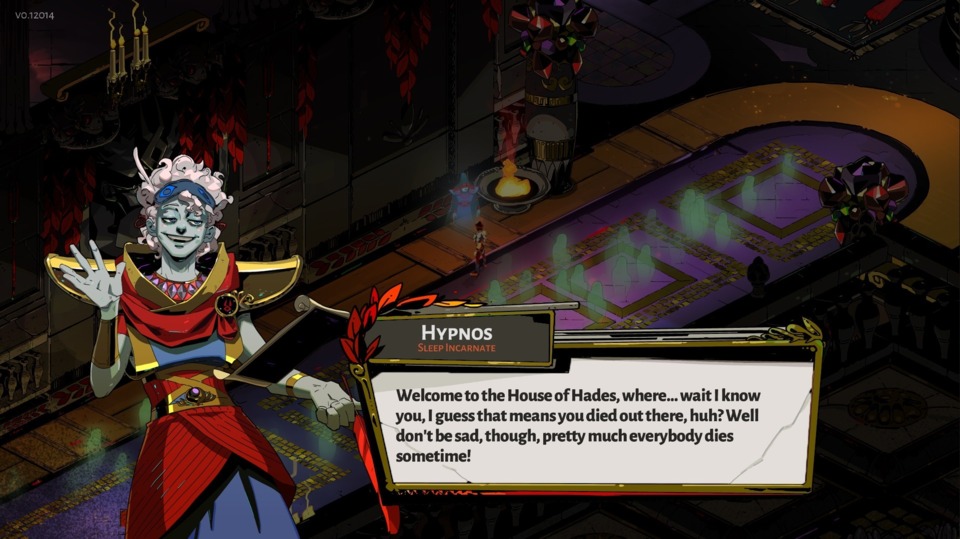
Hades mostly solves the problem I tend to have with other roguelikes, which is that I don't love it when runs end up feeling like wasted effort. There is almost no wasted energy in Hades. It doesn't matter if you only get to the first boss or push your way through to the final barriers. If you fail, there are always persistent upgrades to acquire, and new story beats to experience. I don't think I ever felt like I had a useless run in Hades, because there was always something new to experience, even if it was something small.
It's also a blast to play. All the different weapons have their value, and the incredible array of powers the pantheon of gods bestow upon you give you so many different ways to approach each run. When you get the right mix of bonuses, you can get into some truly game-breaking territory, and I mean that in the best possible way. My best runs in Hades felt unfair, like I'd found some secret code to success. You don't frequently get those runs, but they happen just often enough to keep you chasing that dragon. Or hydra in this case, I guess.
If you've ever played a Supergiant game, you know the art is going to be crisp, and the music is going to slap. Both are true of Hades, some of the studio's best work in both categories. It's not my favorite of all of Supergiant's stories--Pyre's still the king for me there--but I do think Hades is their most complete game. Everyone who worked on this thing should be immensely proud.
1. Spiritfarer
Spiritfarer isn't so much my game of the year as my year in video games in 2020 made manifest. In another year, it might not have taken my top slot. In 2020, Spiritfarer, through sheer insane chance, managed to intersect with so many major--and if I'm being real, tragic--moments of my year that I can't imagine putting anything else in this slot. It's a very good game I absolutely would have enjoyed had it not managed to constantly mix itself among these moments, but man...
Before I go any further, I need to warn of a couple of things. This is not going to be a happy piece of writing, and I am definitely going to spoil the hell out of this game. I don't think spoilers really have any bearing on what makes Spiritfarer so good, but consider yourself forewarned.
Spiritfarer is a game about death that is the opposite of morbid. It is a game about the acceptance of death, about finding peace in the life you lived, the people you loved, and embracing whatever comes in the great beyond. You play as Stella, a plucky girl who lands in a sort of purgatorial space, a vision of an afterlife where spirits drift around little islands on a big ocean. Charon, the ferryman of the dead, tells you that his watch has ended, and you are set to take over. Stella is assisted by her little cat, Daffodil, a delightfully fluffy helper who you can control if you opt to try Spiritfarer's co-op mode. You start out with a small boat, and meet a single spirit, Gwen. She appears as a deer--all the main spirits take the shape of animals, or otherwise inhuman forms--and instructs you on the basic tasks required of your vocation. She is at once a bit aloof, maybe even a bit smug, but there is a warmth under that exterior that feels familiar. She speaks to you as if you were long acquainted, though at this point in the game you're not really sure what that means. It is enough to know that she's here to help, and eventually, you will help her.
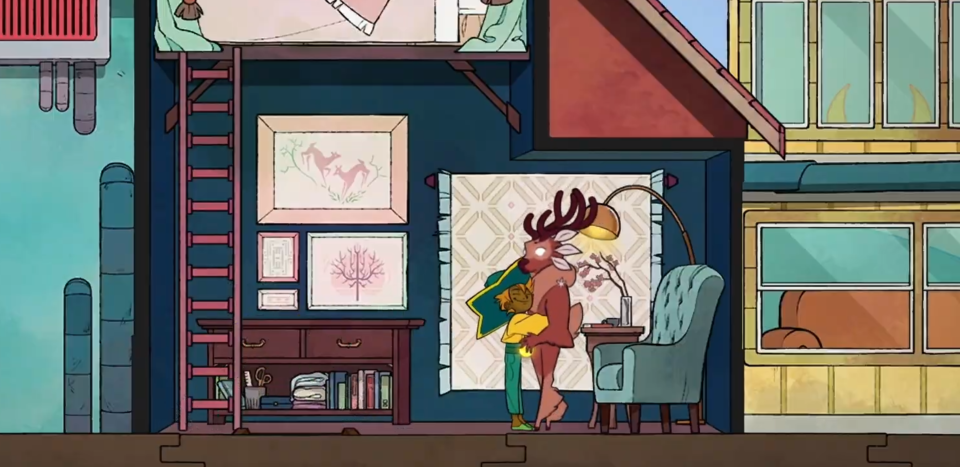
You meet a number of spirits throughout the game. Some are friendlier than others, but all are in need of assistance in some way. They have unfinished business to take care of before you can send them to the Everdoor, the gateway that releases them into whatever lies beyond. A lot of what you end up doing for them amounts to chores--preparing their favorite foods, building them residences on the boat, running errands around the world, and so on. You bop around these islands, collecting resources and building an ever-growing array of gardens, animal pens, and industrial buildings to craft and create whatever is needed. It's a lot of busywork, but it never feels tedious. I enjoyed doing these tasks because the game is so good about investing you in these personalities. Even if they're kind of jerks at the outset, there's a sense that there may be something worthwhile under that veneer, that pulling at the right threads will reveal more than initially meets the eye, and that usually proves true.

Long before Spiritfarer came out in August, and even before COVID fully crashed into the world in an irreparable way, there was an air of death hanging over this year for me. In January, I got a call from my mother telling me that my uncle Baron had been diagnosed with ALS. I call him my uncle, but Baron wasn't a direct relative. He was my mother's first husband, and lifelong friend. They married in the '60s, when he was working as the head photographer for the newly launched Rolling Stone magazine, and my mother was in her then-young career as a ballet dancer. They were married for many years, but eventually grew apart. My mom wanted to start a family, and that wasn't where Baron's head was at. Eventually my mom met my dad, her and Baron agreed to divorce, and their relationship shifted from a romantic one to one of deep and lasting friendship. Baron never stopped being supportive of my mother in the ensuing years. He was adamant about making sure she was financially secure following their break-up, and never stopped caring about her wellbeing. When I was born, Baron was very much a part of our lives. Even after we moved to Virginia for several years, whenever we'd go back to California to visit my mom's folks, we'd see Baron, and sometimes even stay at his house in Mill Valley.
I don't have a lot of close family, especially on my mom's side. Her only brother died before I was born, and very few people from her parents' families were still alive for long after I came into the world. What I did have was Baron. I don't want to overstate the nature of our relationship--he wasn't a constant in my life, but he had as much of an impact on me as any blood relative I've ever had. Baron's history in the world of classic rock was always fascinating to me, and his presence helped guide me toward music as a creative outlet. More than anything else, he was just such a warm, loving guy. One of those people who lit up nearly any room he walked into. He loved people, loved being around them. Up until a short time before his diagnosis, he was still traveling on a regular basis, going to gallery showings, socializing, showing up wherever people would have him. But in late 2019, his energy began to dwindle, and my mom started noticing his speech was becoming more labored when they would talk on the phone. My step-dad is a retired neurologist, and he immediately had a grim suspicion about what was happening. Not long after suggesting he see a specialist to pinpoint what was going on, it became clear that it was ALS. At 82, there weren't many possible outcomes for a diagnosis like that. We braced ourselves for the reality that the end was going to be coming sooner rather than later.
When February came, my mom and I started talking about when we might be able to go out and see him. We were still having those discussions in March when word came down that we would no longer be going into the office--or, really, much of anywhere--in the immediate future. Travel plans, understandably, were put on hold. We held out hope in the ensuing weeks that things would sort themselves out, that the COVID outbreaks would get under control, and maybe when the summer came around, we could finally go out there and visit him. Suffice it to say, those hopes did not come to fruition.
My favorite character in Spiritfarer was Uncle Atul. Atul is a portly and jovial frog who has a kind of boundless energy. He loves food, any food you give him. He loves to build things, and help out wherever he can. Underneath that joy, there is a hint of a deeper sadness that is maybe masked by all that boisterousness, but what's absolutely genuine is his friendliness and loving nature. A key thing about Spiritfarer's structure is that there's no order to which spirits you usher off to their final rest. You meet and unlock them in a somewhat set progression, but until you fulfill all their needs, they won't opt to leave. I had Uncle Atul on my boat for a huge portion of my playthrough, because I just couldn't bear to see him off. Though their interests and presentations were wildly different, there was something about Atul's jovial nature that reminded me a bit of Baron. The way they seemed to light up any conversation they were in. If not exactly alike, they were of a kind. I needed Atul around. I wanted to spend as much time with him as I could, maybe because I was so frustrated that I couldn't go and see Baron. His presence was, in some strange way, filling a void.
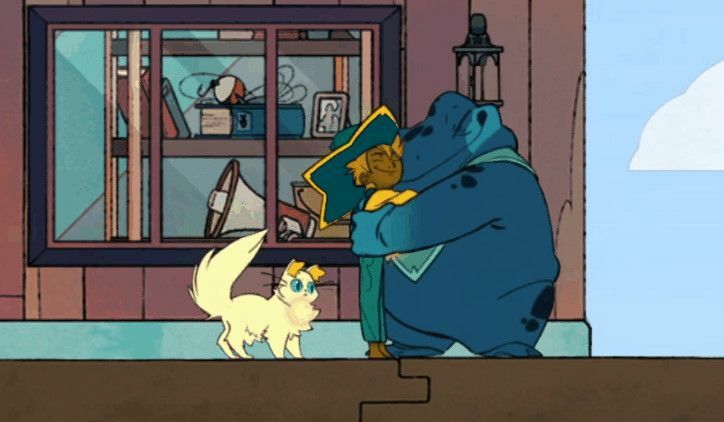
Over the summer, Baron's condition progressed, but he kept on trucking. He made it to his 83rd birthday in June, a more somber occasion than usual, but I was glad he made it. I kept hoping some miracle would happen and travel would become possible again, but to no avail. Eventually the suggestion was made that we try having some Zoom calls with him, so we could have the chance to interact face to face. Baron was weak at this point, but seemed happy to see our faces. It was difficult to understand what he was saying, but he had assistance on that front. Blake, a close friend and confidant he'd known since he moved to Santa Fe many years ago, spent a great deal of time with Baron over the course of 2020. She assisted him with his affairs--including working to organize the donation of his archives to the Rock & Roll Hall of Fame--helped him eat his meals, essentially acted as a caregiver on a regular basis. On those Zoom calls, Blake more or less served as a translator for what Baron was trying to communicate. I could tell his inability to speak was frustrating to him, a man so accustomed to having things to say to everyone around him. But Blake helped alleviate that frustration a bit, and for the few weeks we did those calls, I felt a little bit better. I was just happy to see his face, and to have the chance to interact with him, impersonal as it may have felt. However, after a handful of calls, the next one kept getting delayed. Baron wasn't feeling well, or he had other things he needed to take care of. I accepted that I may have seen him for the last time, but held out hope there might be a chance for another call down the road, remote as that possibility seemed.
I'd been playing Spiritfarer here and there for a couple of weeks when September came. While it was clear by that point that travel to New Mexico--or, really, anywhere--was not in the cards for likely the rest of the year, life had fallen into a sort of labored routine at home. We'd been quarantining long enough that we had a sense of how to go about our daily lives relatively safely, and with numbers in New York in a far better place than they had been in the early months of the pandemic, Sam and I had made some plans to go up to a little place upstate to get away from the city for a few days. We'd been trapped in our apartment for so long that we needed a chance to decompress a bit. It was the first thing we'd had to look forward to in a long while.
And then we lost Thelma.
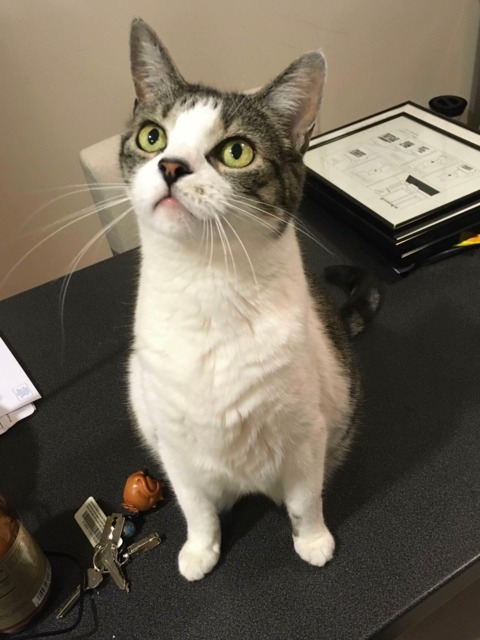
Thelma was a street cat who wandered into a former coworker's backyard back when I worked at Harmonix. I'd recently moved to Boston, and I was severely missing the feeling of having a pet. I grew up with cats in our household all my life. This was the first time I'd lived anywhere without a pet, and it felt a little empty. My coworker couldn't keep Thelma. He had dogs that were not especially cat friendly, and he posted on our internal bulletin board asking if anyone was interested in adopting her. I saw her picture and I just melted. She had this face, this unbelievable face. These big, piercing eyes, with a little beauty spot on her left cheek. I fell in love without even meeting her, so I talked with him, and we agreed that I would adopt her.
She was very skittish at first. I had roommates at the time, and they took to her immediately, but she was more wary. She hid under the bed in my room for weeks after I brought her home, and on two separate occasions tried, and succeeded, to jump out a third story window. The first time she jumped to a neighbor's rooftop, and then eventually back into the apartment, which was harrowing enough. The second time she somehow made it from the third floor balcony all the way down the ground floor, at which point she firmly planted her butt in front of the house and just howled until someone came and got her. I was terrified after that, but thankfully she came out of that scrape with only a chipped tooth to show for it.
Slowly, but surely, she eventually started to warm up, and stopped with her suicidal escape attempts. She never quite abandoned her street cat anxieties, but she started to become more affectionate, and even started sleeping on the bed with me each night. It felt wonderful, because it felt like I'd had to work to earn her trust. Over the course of the next 12 years, she became my little companion, there through some of the best and worst years of my life. She was always a little stand-offish, a little moody, but loving in her own unique way. In my worst year living in San Francisco, when I hadn't quite sorted out my anxiety issues and would find myself dealing with panic attacks on a regular basis, she'd frequently find me balled up on the bed, and nuzzle her way under my arm affectionately. After Sam and I moved in together, she'd sit every night on her cat perch, watching over us as we ate and played games and watched TV. It was like she was keeping watch to make sure nothing happened to us. Every night for years, she'd climb up on the bed, nest herself on my chest, and hang out there for between 15 and 30 minutes, before getting distracted and running off into the apartment. It was our little routine, and I looked forward to it every night.
When Thelma died, it was very sudden. I won't belabor the description of what happened, but it was one of those situations where you go to the vet understanding there is an emergency, and come home with an empty cat carrier. This was the day before we were supposed to go upstate, and it just sucked all the air out of us. That whole day I wandered around the apartment, feeling like a bomb had been dropped on me. My little friend, who had been there with me through so many trying times, was suddenly gone. I'd lost pets before, but in every case before it had been a situation where we could prepare ourselves. They became sick, and we got to spend some time with them before ultimately making the call to put them down. There was no time this time. We couldn't prepare ourselves. Hell, we could barely believe it was happening as it did. After hours and hours of just flailing around the apartment, I, for some reason, decided I needed to play a game to take my mind off what was happening. I booted Spiritfarer up without even really thinking about it. And it so happened that where I had left off was the moment before I was to say goodbye to the first of the spirits, Gwen. Again, without even really thinking about what was happening, I went through the motions and completed the last step on Gwen's questline, taking her to the rowboat and ushering her to the Everdoor.
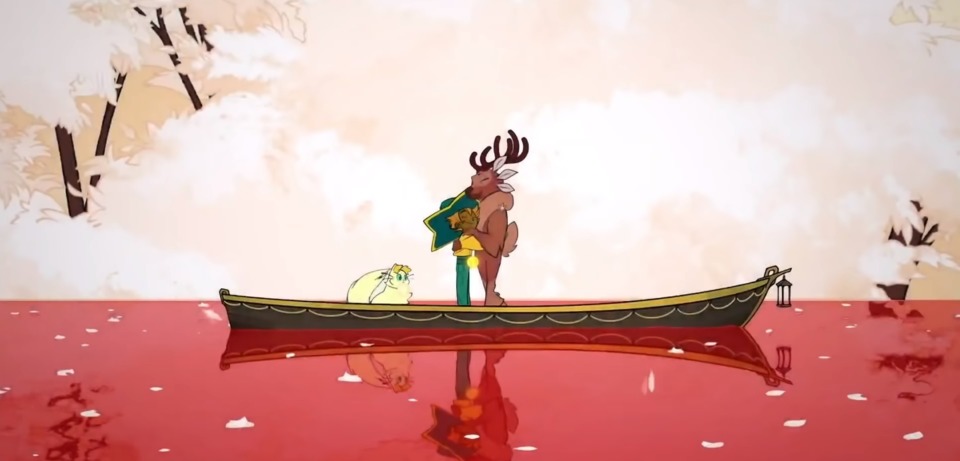
When you say goodbye to a spirit in Spiritfarer, it's a genuinely beautiful moment. The spirits talk, they tell you of the things they've learned, of what they're feeling. In each case, they seem grateful to you and what you've done for them. One of the repeated actions throughout the game is the ability to hug the spirits any time you want. Sometimes they're not in the mood, but when they are, it's always a sweet moment. At the Everdoor, you hug them one last time, and they begin to hover and glow, before disappearing into the ether. My first time seeing this was the night we said goodbye to Thelma, and in that moment, it was like my skeleton liquified in an instant. I fell to the ground in a sobbing puddle. The beauty of the moment was not lost on me, but I could hardly hold myself together. In that moment, I was lightning zapped back into that veterinarian's office, my face buried in her fur, telling her it was OK. That she could go, and that it would be OK.

It never stopped feeling strange to hold onto that particular grief throughout the year. After all, a pet is not a person, and 2020 was a year marked by endless, needless death. So many people lost loved ones to COVID, and that feeling like my grief couldn't--shouldn't--compare nagged at me to the degree that I couldn't quite ever fully give myself over to it in the way I maybe needed to. Plus I was still holding onto the dread of what would happen with Baron. I was caught in this bizarre place between a little death I'd already experienced and a bigger one I knew would be coming. So instead of ever really addressing it, I just let it linger there. It would pop out from time to time. I'd get an image in my head, or see a picture of her, and I'd tear up. Sometimes it snuck up on me, sometimes I sensed it coming around the corner, and considered whether to stifle it or give it some room to walk around. I carried it around like a mass at the bottom of my lungs, never inhaling or exhaling hard enough to dislodge it. It hurt like hell.
In early October, my mom let me know that things were getting worse. He was very weak, and had a couple of periods where it was very touch-and-go. We weren't sure if this was the end, but it felt like we were headed there. On October 4th, he posted a farewell message on Facebook letting everyone know that this would be his last dispatch. As sad as the message was, it had a feeling of gratitude and peace that put me a bit more at ease. I just hoped when his end came, it would be every bit as peaceful. ALS is a horrible disease, and when you're in its final stages, the body can't do a great deal. We knew there might be a point where he would be too weak to do anything, and arrangements for palliative care had been made in such an event. He didn't seem like he wanted to have to make that call himself, and I hoped it wouldn't come to that. Thankfully, it didn't. On November 2nd, he passed peacefully, with Blake by his side. Though I was sad and upset that I could not be there with him, I was grateful that he had someone he cared about there with him in those last moments.
I had only been checking in on Spiritfarer infrequently during this time. I'd said goodbye to a couple more spirits, and pushed myself to make some progress because I knew I wanted to finish it. But it was hard. For as lovely and gentle as Spiritfarer's depictions of death are, it was just a lot to deal with in those moments. After Baron passed, I didn't pick it up again for a while. When I eventually did, I realized I was nearing the end of Atul's questline. As much as I loved the dude and struggled to part with him, I knew it was gonna have to happen eventually. So I went through the motions and did what I was supposed to do, girding myself to say goodbye to my in-game uncle. Except that goodbye never came. Atul is one of the only spirits you don't send to the Everdoor. He disappears after you finish his final request, and you never see him again. Once again, I felt like the whole bottom dropped out from under me. It's not that I was angry at the game or anything, I just didn't know how to feel. I never really got to say a final goodbye to Baron, to have that moment of closure before he passed, and here this game was, once again mirroring that feeling.
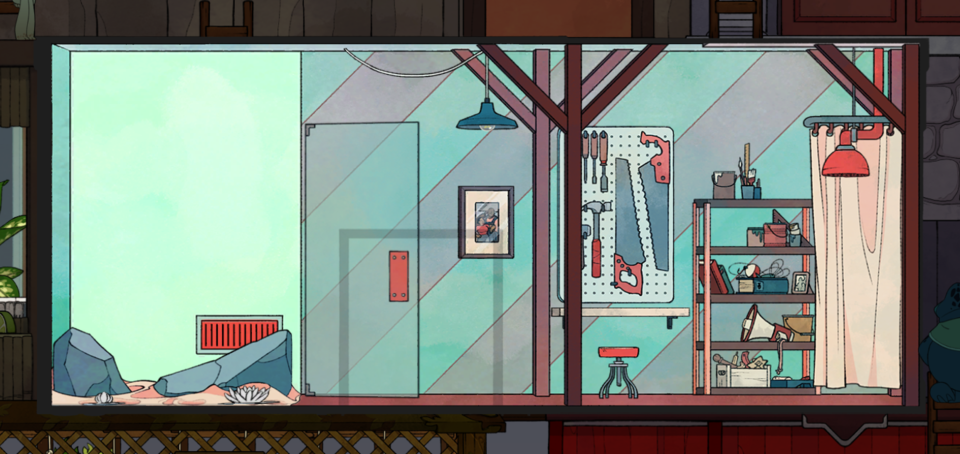
By the time I finally brought myself to wrap up Spiritfarer's campaign, it was December. We'd had a memorial for Baron over Zoom a couple of weeks after he passed. An imperfect solution to an impossible problem, but it was the best that could be done, and though it was devoid of the hugs and in-person comfort a real life memorial offers, hearing people tell stories of his life--some of which I knew, some which were entirely new to me--helped a little bit. I was still having these overwhelming pangs of grief crash into me at random intervals. There were streams we did on the site where I was having to expend some serious mental energy to keep myself together. I just couldn't figure out what to do with those feelings.
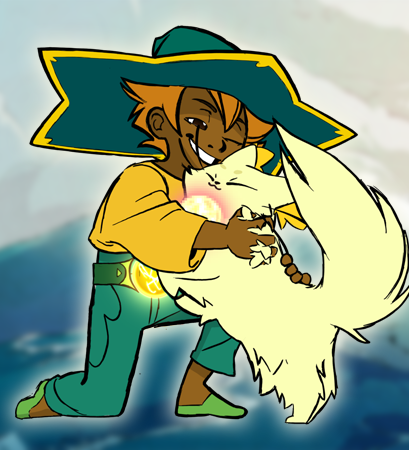
On my final day with Spiritfarer, I had done everything I felt like I was going to do. There were side quests left unfinished, but I had said goodbye to everyone that had crossed my boat, and I had seen the story through. What the story revealed was along the lines of what I had suspected early on. Stella isn't happening on these people by chance. You learn through a series of scenes that in her previous life, Stella was a caregiver. She worked in a hospice, helping terminally ill people in their final days. Not everyone you encounter in the game is an ex-patient, but they're all people Stella encountered during her travels. Then Stella herself got sick, and she became the Spiritfarer, doing for these transient souls what she had done in life. Now it was time for her to go, and though I wasn't really ready, I needed to be done.
So I went. I rowed Stella and Daffodil to the Everdoor, a more silent journey than the ones I'd experienced before. There's no big twist, no big reveal at the end. You go where everyone else went, you give your cat the biggest hug, and you both take your journey to the other side. That's all there is to do, and it was all that I needed.
When I say that Spiritfarer was my year in video games, I mean it in totality. It was both the thing I found myself playing and thinking about constantly as I went through the miserable motions of the year, and a fairly apt metaphor for how I treated video games in 2020. Even if I never fully accepted them as such, games were my busywork, the thing I used to try to fill the spaces where my grief kept encroaching. I still haven't quite figured out what to do with all that grief, even as we work our way through the beginnings of 2021. I still have those moments where the emotions swell up out of nowhere, and I am forced to confront that empty feeling. But I also feel a little bit better than I did before I finished Spiritfarer. It's not that I think the game is saying anything deeply profound about life and death that has never been said before, but it's very effective at delivering its heartfelt notions about how to approach the inevitable. And its sincere appreciation for caregivers is something I love it for. 2020 was a year filled with people dying in terrible circumstances, often unable to be surrounded by the loved ones they'd want to see before they pass. Instead, frontline medical workers, hospice workers, were often the only people to be there to see them off. In Baron's case, it does my heart good to know that his caregiver was someone close to him, someone who helped him so tremendously through the trying final year of his life.
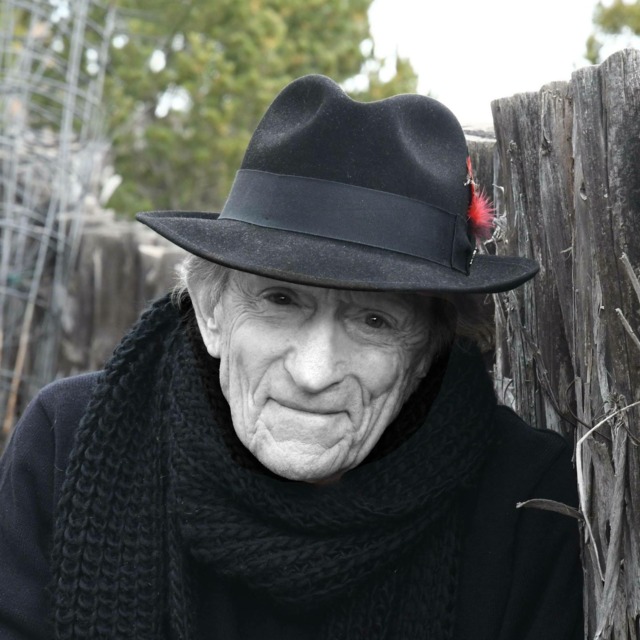
Spiritfarer is about coming to terms with the things you could not in life. It is about accepting that not everything will wrap up the way you want, and that in order to make your peace, letting go of those wants and regrets is vital. I regret every day that I could not be there at the end of Baron's life, and that I had so little time to say goodbye to my friend Thelma. It's taking time for me to let go of those feelings, but as each day passes, and I release a little more of that grief, I can feel myself moving in that direction. I don't know that I will ever get over 2020, exactly, but maybe I'll find a way to accept everything that happened.
More than anything, I just hope that they both know how deeply loved they were, and that I will miss them for the rest of my life.